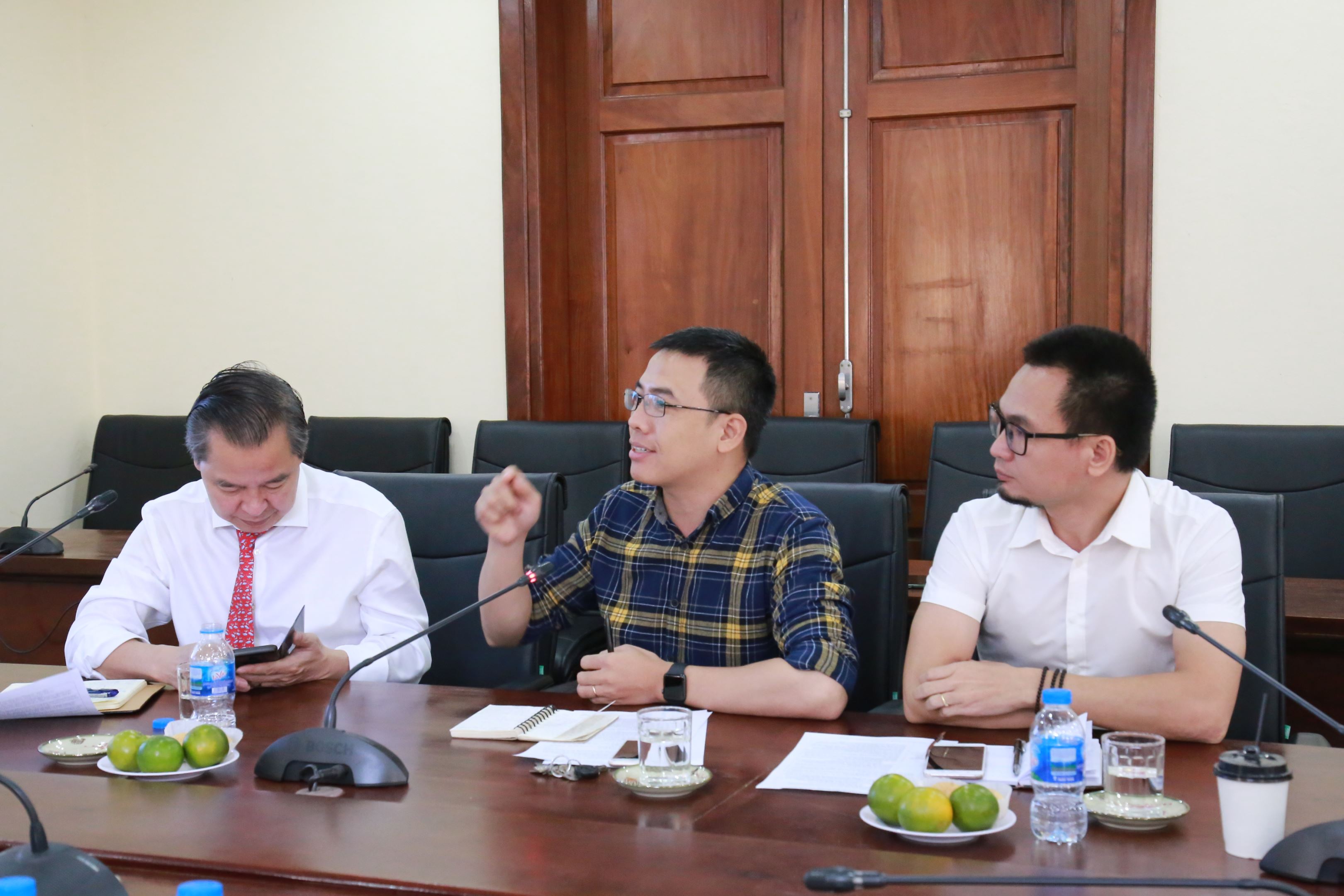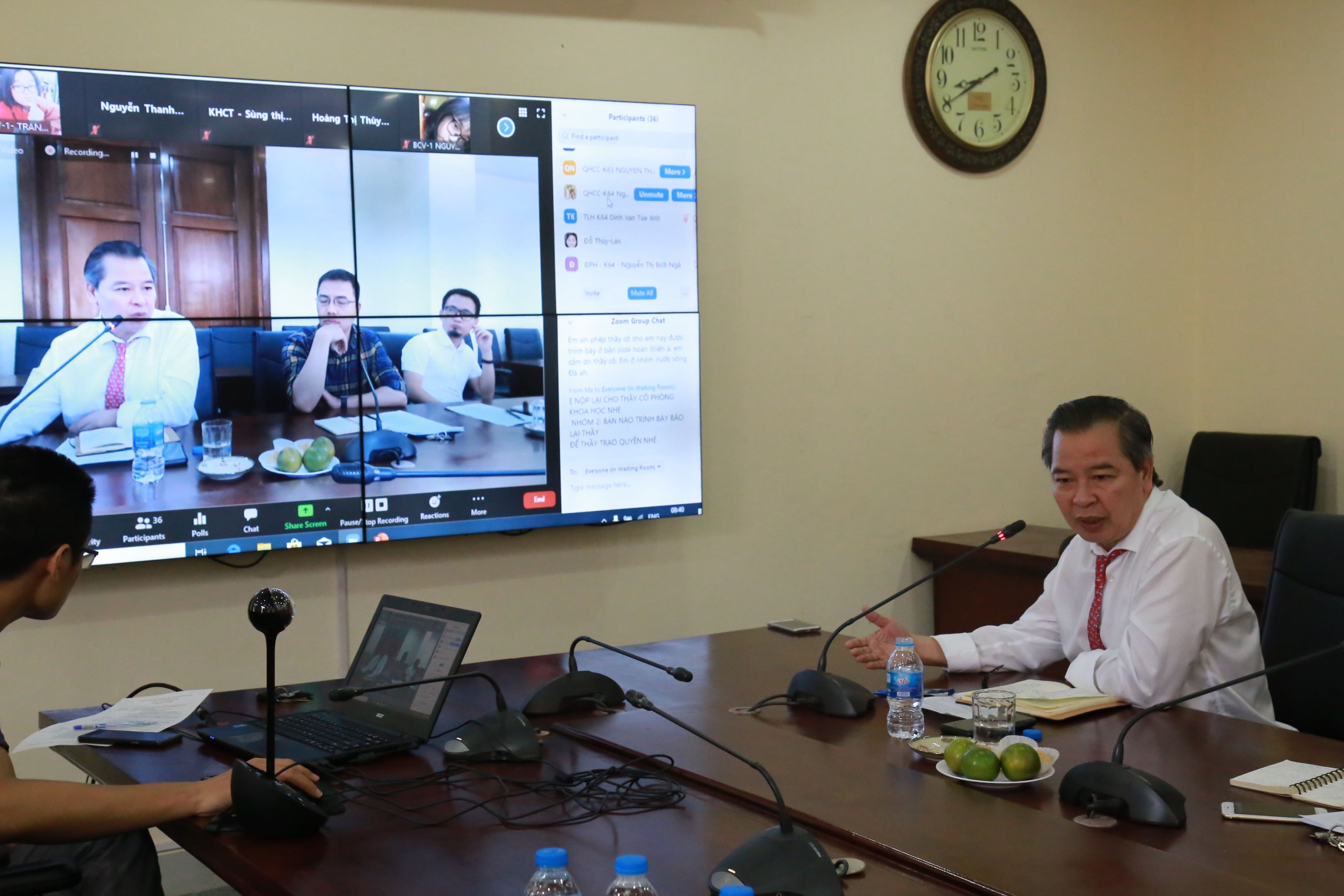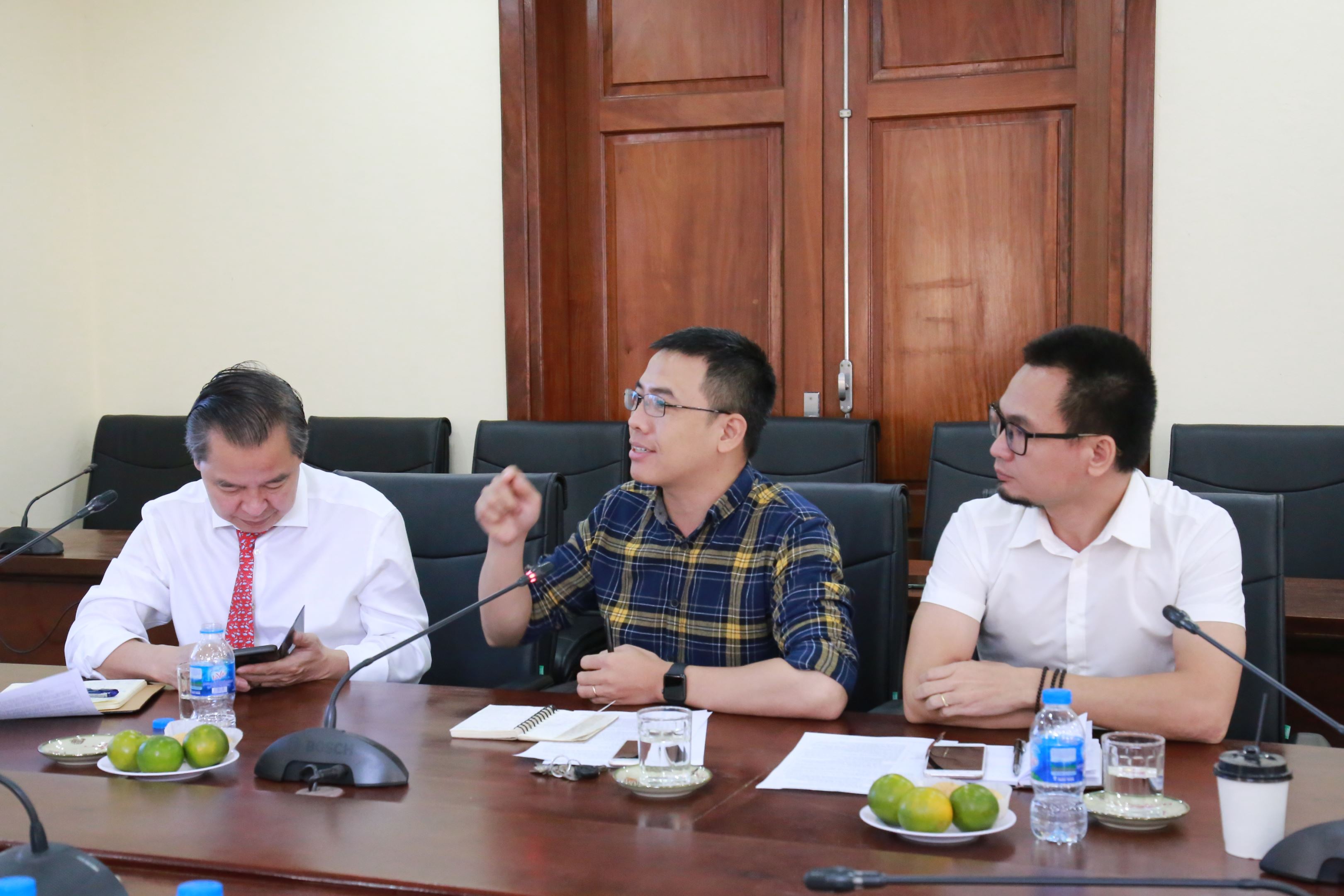
This year's Student Scientific Research Conference is divided into four subcommittees. 28 of the most outstanding research topics were selected for presentation in each subcommittee. Each subcommittee has three lecturers who chair and manage the conference, providing feedback, critiques, and suggestions for the student scientific research projects.
Professor Pham Quang Minh, the Rector of the University, stated: "To ensure health and safety in the context of the Covid-19 pandemic, which is still not completely under control, the University decided to organize the University-level Scientific Research Conference online. The students participated enthusiastically, clearly demonstrating the spirit that no difficulty can hinder the learning spirit of humanities students: School attendance may be temporarily suspended, but learning and scientific research will not be suspended."

Professor Pham Quang Minh delivered a speech.
In addition to the organizing committee members and the students participating in the presentations, invitations and subcommittee IDs were sent to each student and faculty member via email. This allowed faculty members and interested students to participate, follow the presentations and debates, and directly comment on the research topics.
Following the students' presentations, the faculty members provided feedback, discussed, and critiqued the topics; pointed out the strengths and weaknesses of the research; and offered suggestions to further clarify research methods, presentation styles, citations, concept development, and the construction of personal viewpoints… in order to improve the students' first research projects.
This year's student research season saw 106 projects win awards, including 28 first-prize winners, 35 second-prize winners, and 43 third-prize winners.
This success is the result of the efforts of the University, the Department of Scientific Research Management, and the collective of faculty and students in the university; it is also a continuation of the strong tradition of scientific research among humanities students.
According to MSc. Doan Viet Hai (Department of Scientific Research Management), this is the first time the Student Scientific Conference has been held online, and the organization process was still unfamiliar with many aspects, with the biggest difficulties stemming from the infrastructure such as internet connection and equipment.
Dr. Nguyen Thi Ngoc Dung (Lecturer at the Faculty of Tourism Studies, Head of Subcommittee 4) assessed: Although there were some minor technical and network-related issues, the conference was successful. The lecturers in the subcommittee were very satisfied with the results and presentations. The reports came from many faculties, each study having its own unique style, reflecting the dedication and passion for research of the students. In particular, in Subcommittee 4, she was impressed with the research methods used by the students, such as the Estimated Time (ETA) method and the Cronbach's Alpha reliability analysis method...

Subcommittee 4 comprises the faculties of Tourism Studies, Vietnamese Studies, Archival Studies & Office Management, Religious Studies, and Philosophy.
The faculty members all highly appreciated the students' spirit of participation in scientific research. Dr. Do Van Hung (Head of the Information and Library Science Department, Head of Subcommittee 3) was impressed with the quality of the research projects in this year's student scientific research season. He said: “Although social distancing measures to combat the COVID-19 pandemic caused many difficulties in accessing research subjects such as businesses, vulnerable groups, and children who have been sexually abused, the students still made efforts and completed their research well. Each research project was at least 80 pages long, with some reaching up to 160 pages, demonstrating a very large volume of work; some of the data and arguments were assessed by the faculty as having reached the quality of a master's thesis.”
The students demonstrated their understanding and concern for pressing social and national issues such as: "The current state of online learning among students at the University of Social Sciences and Humanities in the context of the COVID-19 pandemic," "Application of the Bookworm online learning software at Vietnam National University, Hanoi," "The impact of the COVID-19 pandemic on tourism," or issues related to sovereignty disputes such as "The South China Sea in the political calculations of China, the US, and Russia"...
Quick problem-solving skills, perseverance, meticulousness, and creativity in the research process are evident in the research results of the students. Professor Phan Van Kien (lecturer at the Institute of Journalism and Communication Training, member of the steering committee for subcommittee 1) stated that, besides the research ideas, what impressed him most in these projects was the students' ability to read, search, access, and utilize an enormous amount of material.

Teacher Phan Van Kien gave a speech.
Participating in the Student Scientific Research Conference in its new format for the first time, many students had concerns. Nguyen Thi Tu Trinh (Institute of Journalism and Communication Training) shared: “This year, the Student Scientific Research Conference was conducted online, which made me quite worried about technical issues and the ability to manage the time effectively. This is my first year participating in scientific research, and because I lack experience, my colleagues and I still have many shortcomings. However, the conference created a very friendly atmosphere for exchange and discussion between professors and students. This is a very meaningful opportunity for us to improve our expertise, research skills, and presentation abilities.”
Despite overcoming difficulties and hardships during the process of conducting their scientific research projects, the students all felt that student scientific research was a meaningful activity, helping them improve their teamwork skills, work with materials, and accumulate more specialized knowledge. Student scientific research is also a valuable opportunity for them to receive direct and dedicated guidance from highly qualified professors, and to have many opportunities to learn and develop. At the same time, scientific research is also an important activity in determining the future direction of the students.
In fact, organizing online conferences is a new trend, helping to connect and bridge geographical distances between the organizing committee and students throughout the university; it's an interesting way for students to adapt to the digital age, as mentioned recently in the "Digital Humanities" trend. The success of this conference is proof that students of the University of Social Sciences and Humanities have a high spirit of learning and research, as well as a determination to overcome difficulties and challenges to achieve the learning and teaching plans and goals of the University.
Author:Nguyen Nga
Newer news
Older news